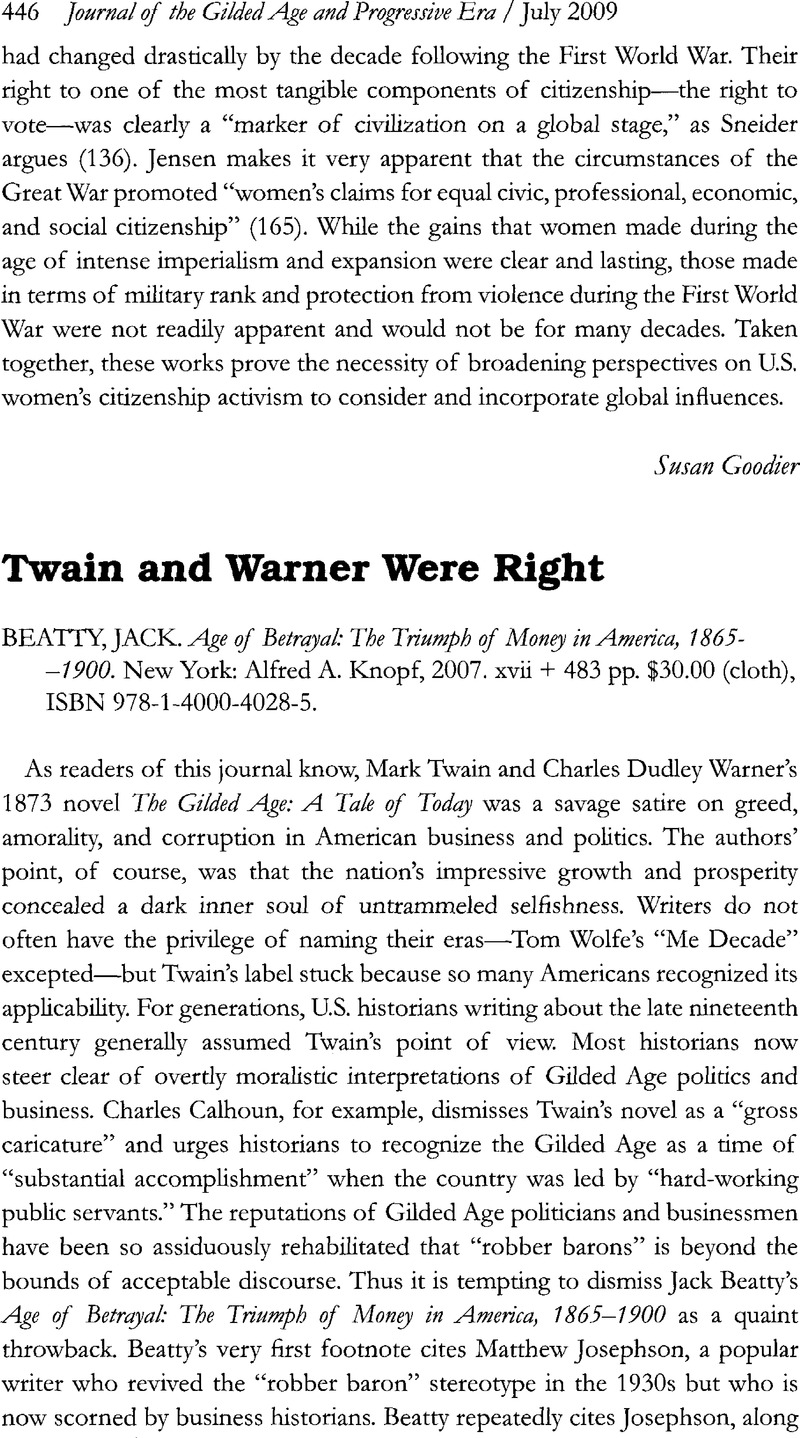No CrossRef data available.
Published online by Cambridge University Press: 08 November 2010

1 Calhoun, Charles W, ed., The Gilded Age: Perspectives on the Origins of Modern America, 2nd ed. (Lanham, MD, 2007), 1, 240; John Steele Gordon, “Getting the Gilded Age All Wrong,” <http://www.americanheritage.com/articles/web/20070417-railroads-age-of-betrayal-robber-barons-jack-beatty-time-zones-jay-gould-william-mckinley-gilded-age.shtml>. See alsoGoogle ScholarLewis, Mark, “Cowboys and Robber Barons,” New York Times, 22 July 2007Google Scholar.
2 For balance see Edwards, Rebecca, New Spirits: Americans in the GildedAge, 1865-1905 (New York, 2006)Google Scholar; , Edwards, Angels in the Machinery: Gender in American Party Politics fromthe Civil War to the Progressive Era (New York, 1997)Google Scholar; Smith-Rosenberg, Carroll, Disorderly Conduct: Visions of Genderin Victorian America (New York, 1985)Google Scholar; Clinton, Catherine, The Other Civil War: American Women in the Nineteenth Century, rev. ed. (New York, 1999); andGoogle ScholarCordery, Stacy A., “Women in Industrializing America,” in The Gilded Age, ed. Calhoun, , 119–42Google Scholar.
2 Bierce, Ambrose, The Unabridged Devil's Dictionary, ed. Schultz, David E. and Joshi, S. T. (Athens, GA, 2000), 184.Google Scholar
4 On the Colton Letters, see Daggett, Stuart, Chapters on the History of the Southern Pacific (New York, 1922), 154–68Google Scholar.
5 For corroborating opinions see also Remnick, David, ed., The New Gilded Age: The New YorkerLooks at the Culture of Affluence (New York, 2000)Google Scholar; Phillips, Kevin, Wealth and Democracy:A Political History of the American Rich (New York, 2002)Google Scholar; McHugh, Michael, The Second GildedAge: The Great Reaction in the United States, 1973-2001 (Lanham, MD, 2006)Google Scholar; Krugman, Paul, “Gilded Once More,” New York Times, April 27, 2007Google Scholar; Uchitelle, Louis, “Age of Riches: The Richest of the Rich, Proud of a New Gilded Age,” New York Times, July 15, 2007Google Scholar; Henwood, Doug, “Our Gilded Age,” Nation, June 30, 2008Google Scholar; Bartels, Larry M., Unequal Democracy: The Political Economy of the New Gilded Age (Princeton, 2008)Google Scholar.
6 Frank, Thomas, What's the Matter with Kansas? How Conservatives Won the Heart of America (New York, 2004).Google Scholar But see also Bartels, Larry M., “What's the Matter with What's the Matter with Kansas?” Quarterly Journal of Political Science 1:2 (2006): 201–26CrossRefGoogle Scholar.